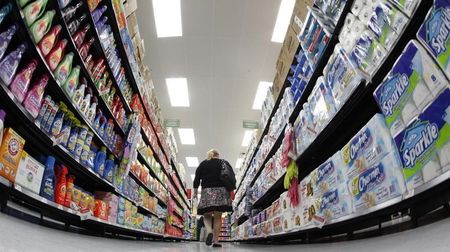By Jason Lange WASHINGTON (Reuters) - While the appearance of the deadly Ebola virus in Texas is worrying the nation, it has yet to lead Americans to take a more cautious view over how to spend their money, data suggested on Friday.
The Thomson Reuters/University of Michigan index of consumer sentiment unexpectedly rose in early October to its highest level since July 2007.
Separate data showed groundbreaking for new homes rose more than expected last month, and taken together the reports pointed to solid U.S. economic growth.
"The underlying strength of the U.S. economy remains intact," said David Berson, an economist at Nationwide Mutual Insurance in Columbus, Ohio. "If it were not for Ebola and geopolitical concerns, these (sentiment) numbers would be higher."
The data for the sentiment survey was collected between Sept. 25 and Oct. 15, a period in which Americans have been barraged by news of Ebola's spread in West Africa, where it has killed thousands, and its appearance in the United States.
U.S. officials have confirmed three Ebola cases, all in Dallas, since Sept. 30 - a Liberian man who later died of the disease and two nurses who had cared for him and are now being treated.
Investors have been concerned that Ebola, if not contained in the United States, could scare consumers and lead them to cut back on spending, though there is little sign of that so far.
The consumer sentiment survey period also overlapped with the global stock market sell-off earlier this week.
Economists polled by Reuters had expected the sentiment index to fall, but instead it ticked two tenths of a point higher to 86.4. Consumers were more upbeat about their personal finances and the national economy.
Other measures of consumer confidence have also failed to show much alarm. Gallup's daily poll of economic sentiment has been stable in recent weeks. At least when it comes to spending decisions, consumers remain focused on a strengthening economy.
"Despite rising media coverage, Ebola seems to have had little discernible effect on consumer sentiment to date," Goldman Sachs analyst Kris Dawsey said.
The U.S. unemployment rate fell to 5.9 percent last month, a six-year low. Investors think the stronger job market will lead the Federal Reserve to raise interest rates next year after holding them near zero since 2008, though worries about the global economy and chronically low inflation have recently led them to bet the hike would be delayed until late in the year.
HOUSING RECOVERY INTACT
A stronger job market helped the housing market recovery to advance last month, with groundbreaking at building sites rising more than expected.
Housing starts rose 6.3 percent to an annual 1.02 million-unit pace, the Commerce Department said, the latest sign the sector was continuing to claw back after the implosion that touched off the 2007-2009 financial crisis and recession.
Newly issued permits also rose.
"If you look at the trend, you are still seeing an upward trajectory," said Michelle Meyers, an economist at Bank of America Merrill Lynch in New York.

U.S. stock prices jumped following a batch of solid corporate earnings reports, including profits by General Electric (N:GE) that topped analyst expectations. Share prices had fallen sharply earlier in the week, and the bounceback sucked money away from U.S. government debt, pushing yields higher for a second straight day.
(Reporting by Jason Lange; Additional reporting by Richard Leong and Rodrigo Campos in New York; Editing by Tim Ahmann)
